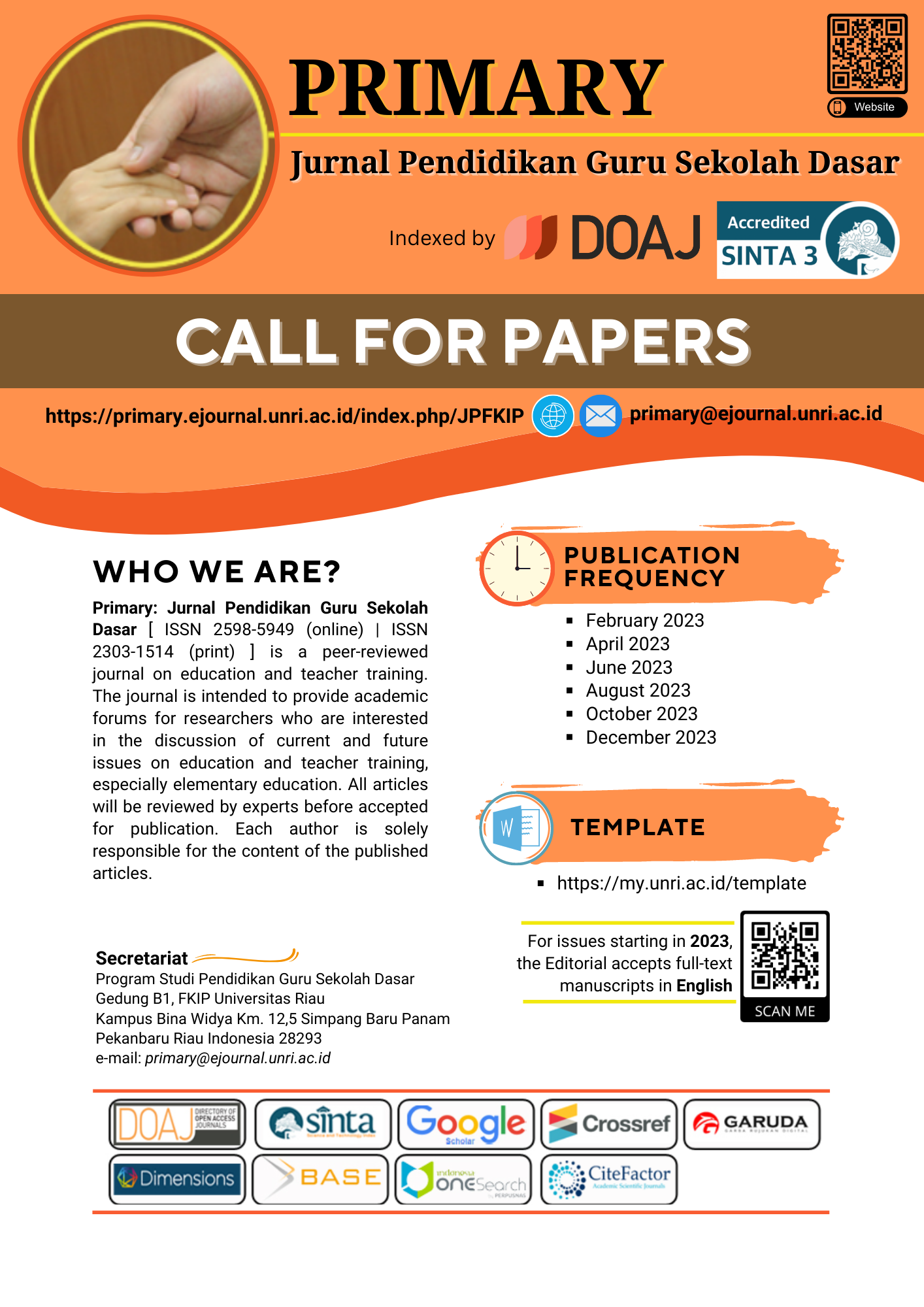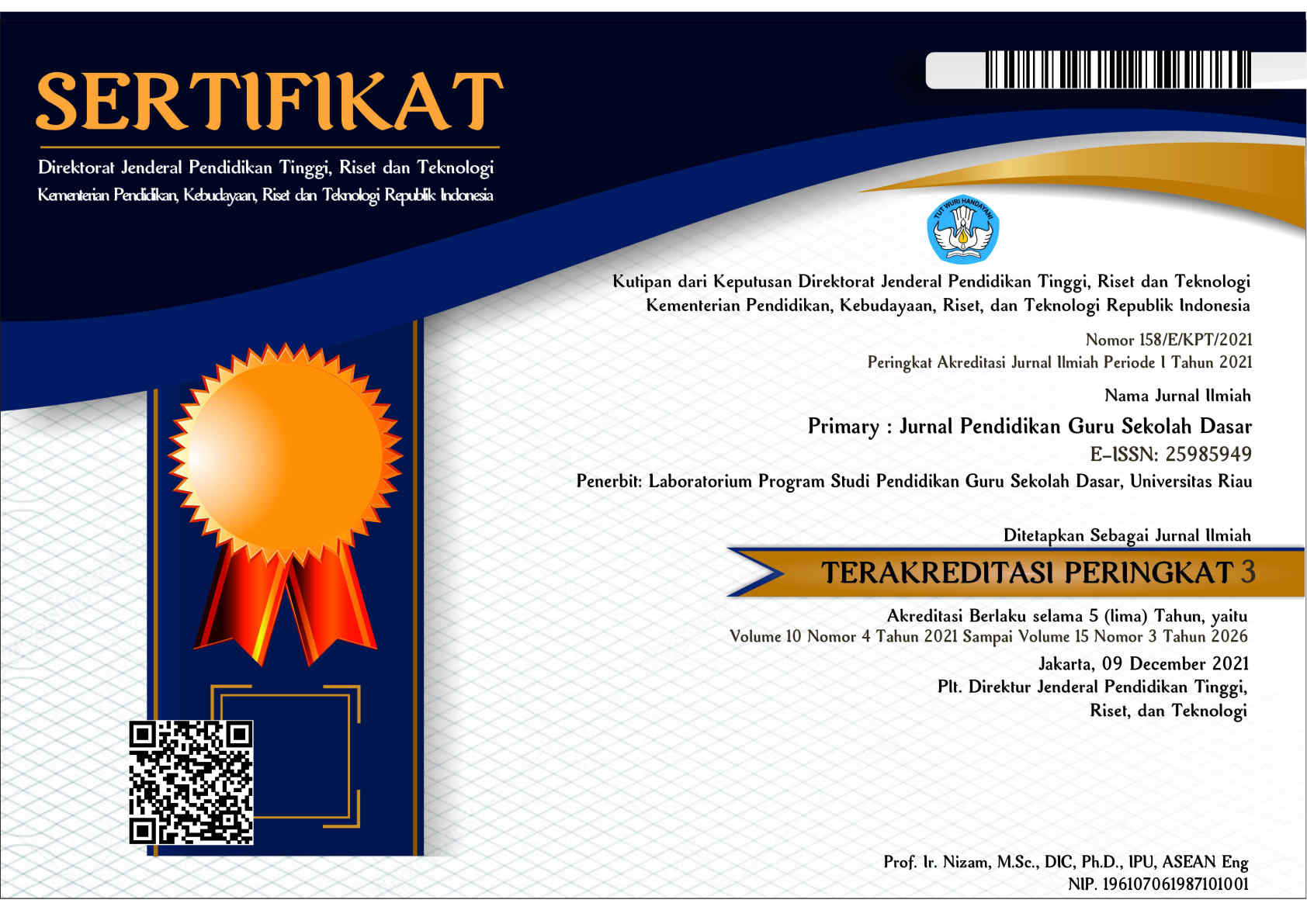THE EFFECT OF BOOKLET – ASSISTED CTL MODEL ON THE STUDENTS’ CREATIVE THINKING ABILITY AT GRADE IV ELEMENTARY SCHOOL
Abstract
This study aimed to analyze the effect of Contextual Teaching and Learning (CTL) model assisted by booklets on the students’ creative thinking ability at grade IV elementary school. The choice of booklet media CTL model was considered appropriate for SDA and poetry materials on the theme of Cita-Citaku. Students could relate the materials to their life environment through CTL model and booklet media; this can be done in groups or individually. This study was quantitative experimental research with nonequivalent posttest-only control group design. The samples in this study were fourth grade students of SDN 1 Bulungcangkring as the experimental class and fourth grade students of SDN 3 Bulungcangkring as the control class. Based on the results of the study, it was revealed that (1) the thinking ability of students taught with CTL model assisted by booklet was better than those taught by the lecture model; (2) the average creative thinking ability of students taught with the CTL learning model was more than 70 (KKM). It could be concluded that there was an effect of Contextual Teaching and Learning model assisted by booklets on the students’ creative thinking abilities at grade IV elementary school.
Keywords
Full Text:
PDF (Bahasa Indonesia)References
Bagaray, et all. (2016). “Perbedaan efektivitas DHE dengan media buklet dan media flipchart terhadap peningkatan pengetahuan kesehatan gigi dan mulut siswa SDN 126 Manado”. Jurnale-GiGi(eG), 4(2): 78-82.
Dinni, H. N. (2018). HOTS (High Order Thinking Skills) dan Kaitannya dengan Kemampuan Literasi Matematika. Prosiding Seminar Nasional Matematika, 171.
Hamdayana, J. (2014). Model dan Metode Pembelajaran Kreatif dan Berkarakter. Bogor: Ghalia Indonesia.
Kurniadi, G. & Purwaningrum, J. P. (2018). Kemampuan Pemahaman Matematis Siswa Melalui Discovery Learning Berbantuan Asesmen Hands On Activities. ANARGYA: Jurnal Ilmiah Pendidikan Matematika, 1 (1): 8-13.
Pralisaputri, et all. (2016). Pengembangan Media Booklet Berbasis SETS pada Materi Pokok Mitigasi dan Adaptasi Bencana Alam untuk Kelas X SMA. Jurnal Bioedukatika Vol. 2. No. 2.
Riana, A. (2017). Application of Means Ends Analysis (MEA) Learning Model in Attempt to Improve Student’s High Order Thinking. International Journal Pedagogy of Social Studies, 2 (1): 1-7.
Sanjayanti, et all. (2017). Pengaruh Model Contextual Teaching Learning Bermuatan Pendidikan Karakter Terhadap Keterampilan Berpikir Kreatif Dan Sikap Ilmiah Ditinjau Dari Motivasi Belajar. e-Journal Program Pascasarjana Universitas Pendidikan Ganesha Program Studi Pendidikan IPA Volume 3
. Shoimin, A. (2014). 68 Model Pembelajaran Inovatif dalam Kurikulum 2013. Yogyakarta: Ar- Ruzz Media.
Umamy, S.P.H., & Mintohari. (2017). Pengaruh Model Pembelajaran MEA (Means Ends Analysis) Terhadap Hasil Belajar Siswa Kelas IV SD Kebraon 1 Surabaya. Jurnal PGSD, 4 (2): 621-629.
Winarti. (2015). Contextual Teaching And Learning (Ctl) Untuk Meningkatkan Kemampuan Berpikir Kreatif Siswa. JPFK, Vol. 1 No. 1.
Suprapti, I. (2018). Belajar Kelompok pada Mata Pelajaran IPS di Kelas IV Sekolah Dasar. Jurnal Bidang Pendidikan Dasar, 2 (1), 48-56.
Thalita, dkk. (2019). Penerapan Model Pembelajaran TGT untuk Meningkatkan Keaktifan Belajar Siswa Kelas IV. JPGSD UPI. 4 (2), 147-156.
DOI: http://dx.doi.org/10.33578/jpfkip.v10i3.8023
Refbacks
- There are currently no refbacks.
Copyright (c) 2021 Shinta Dewi, Murtono Murtono, Ratri rahayu

This work is licensed under a Creative Commons Attribution-NonCommercial-ShareAlike 4.0 International License.
____________________________________________________________
Primary: Jurnal Pendidikan Guru Sekolah Dasar
Secretariat
Program Studi Pendidikan Guru Sekolah Dasar
Gedung B1, FKIP Universitas Riau
Kampus Bina Widya Km. 12,5 Simpang Baru Panam
Pekanbaru Riau Indonesia 28293
e-mail : primary@ejournal.unri.ac.id




